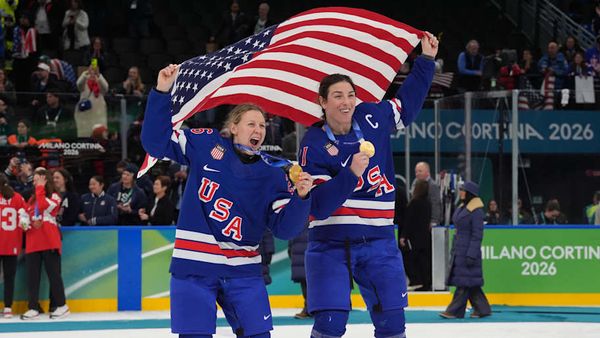SEATTLE — Over the past 44 seasons, Randy Adamack has seen almost every bit of Mariners history and lived it from the inside.
From Lenny Randle blowing the ball foul to Gaylord Perry's 300th win to Felix's perfect game. From Funny Nose Glasses Night to Buhner Buzz Cut to the falling ceiling tiles. From Kingdome to T-Mobile, from the miracle of '95 to the 116 wins of 2001 to the near-misses and on-field frustrations ever since, Adamack was there for all of it.
From Ruppert Jones to Bill "Cuffs" Caudill to Alvin Davis to Ken Griffey Jr. to Felix Hernandez to Julio Rodriguez, Adamack was there. But not just the stars — Adamack also knew the journeymen, the cup-of-coffee rookies, the fringe guys and the phenoms, and treated them all with equal respect.
Adamack worked with every Mariners owner and field manager they've ever had, every announcer, every beat writer, and virtually every front-office employee. Many consider him a mentor, most view him as a friend.
Then, somewhere along the line, Adamack himself became a part of the fabric of the Mariners, the eternal voice of reason, the man able to answer every question and help navigate through every crisis.
Quietly, this fount of institutional knowledge, this beloved figure in the organization, walked away earlier this month into retirement. It won't get the attention of, say, Griffey driving away in the middle of the night or manager Mike Hargrove abruptly quitting in the middle of a win streak, but within the Mariners' family, the departure is keenly felt.
"He's kind of the consummate Mariners employee, one of those faces of the franchise behind the scenes," said Alvin Davis. "Randy became the thread that runs through the generations of Mariners baseball."
Adamack arrived midway through the 1978 season, the Mariners' second year of existence, plucked away from the Cleveland organization. Faced with an unexpected opening, the Indians had hired the native Ohioan as public relations director in 1975 at age 23, straight out of a college internship and a very brief offseason stint as the assistant P.R. man.
"Fundamentally, it was a terrible hire," Adamack said with characteristic self-effacement.
But he aced the job, navigating deftly through the intense media attention that followed Cleveland manager Frank Robinson, who that season became the first black manager in baseball history.
"I didn't know any better," Adamack said. "I just thought that's what it's always like."
When then-Mariners president Kip Horsburgh convinced Adamack to come west to a city he'd never seen to fill their vacant P.R. directorship in '78, it was a fundamentally brilliant hire. Yet no one dreamed that this 26-year-old would become a franchise fixture, least of all Adamack.
"At the time, I thought, I'll be there four or five years and figure out what I'm going to do with the rest of my life," Adamack said. "Obviously, I still haven't figured out what I'm going to do with the rest of my life."
Adamack joined a fledgling Mariners organization trying to grab the attention of Seattle. At times, he reflected, that involved "jumping up and down" to remind both fans and media that they were there, too. Over time, Adamack's job title evolved as his responsibilities expanded into marketing, promotions, broadcasting and beyond. His final position was senior vice president and special adviser to the chairman and CEO. What didn't change was Adamack's common decency and ability to relate to everyone, even as his scope of influence grew.
"If there was something — a new idea, a tough situation, what have you — everybody would say, 'Let's ask Randy,'" said Kevin Martinez, the Mariners' longtime VP of marketing and communications. "He was this resource on it, no matter what the topic. It could be a ballpark-operations topic, it could be a baseball-operations topic. His breadth of experience was just so incredible that if something was coming up, you wanted to hear Randy's perspective on it."
Adamack believed fundamentally that the "relations" part of public relations was the most important. He made it a point to talk to players and others when he didn't need something from them, so they wouldn't roll their eyes when he did.
"Whenever Randy came your way, it was never like, 'Oh, no, what's going to be the ask?' He developed personal relations with everyone," Davis said.
As he looks back over his four-plus decades with the Mariners, Adamack is struck most by the stability of the franchise. It's a far cry from the early '90s, when the threat of moving to Tampa Bay was genuine and ever-present. He remembers when his children, 7 and 5 at the time, heard all the rumors and asked plaintively at the holidays if the Mariners were moving to Florida.
Adamack told them no, but it was more on faith than anything. It wasn't until the Nintendo ownership took over, under the auspices of John Ellis and Howard Lincoln, that the franchise stabilized. And when the '95 season galvanized the region and led to Safeco Field, the threat of a Mariners move ceased.
"To me, the underlying story of the whole franchise is how it's now as stable a franchise as there is in sports," he said. "We wish we had championship banners and World Series trophies and all those types of things. But this is Seattle's team. This is the Northwest's team. And this team is going to be here. It's on solid ground and ain't going nowhere. That's a big step forward from the early years."
A few years ago, Adamack reduced his workload and began the process of preparing others to take over his tasks. His final goal — he calls it "a mission" — was to help land the All-Star Game back in Seattle in 2023, which was accomplished with Adamack as the point man last September.
It's a full-circle moment, because Adamack's first assignment upon joining the Mariners in July of '78 was to fly to the All-Star Game in San Diego to help prepare Seattle for hosting its first Midsummer Classic in 1979. Adamack was also heavily involved in landing and staging the 2001 All-Star Game at Safeco Field.
Once the 2023 All-Star Game was safely in hand, Adamack began thinking seriously about retiring throughout last offseason. He knew the All-Star preparation was in good hands with Mandy Lincoln, the senior director of experiential marketing.
"Through that time period, every meeting I was in, every phone call almost, every email, Mandy was involved with the whole process," Adamack said. "And once it was awarded to us and announced, I knew she was prepared to execute on it. That's when I began to think about it (retirement) more seriously."
Adamack will remain involved with a pet project that involves working with a historian to capture the history of the Mariners franchise.
"I'm trying to approach it, to steal an old Dave Niehaus line, as objectively as my subjectivity will allow me to do it," he said.
Adamack has encouraged Mariners staffers to reach out if they have a question or problem, which Martinez jokes could be every day if they didn't restrain themselves. But at age 70, having worked for the Mariners in 44 of their 45 seasons, more than anyone in club history, Adamack came to an inevitable conclusion as he pondered his future.
"You just look in the mirror enough and say two simple words — maybe it's considered three — but the words are: It's time."
Now he can finally figure out what he's going to do with the rest of his life.







